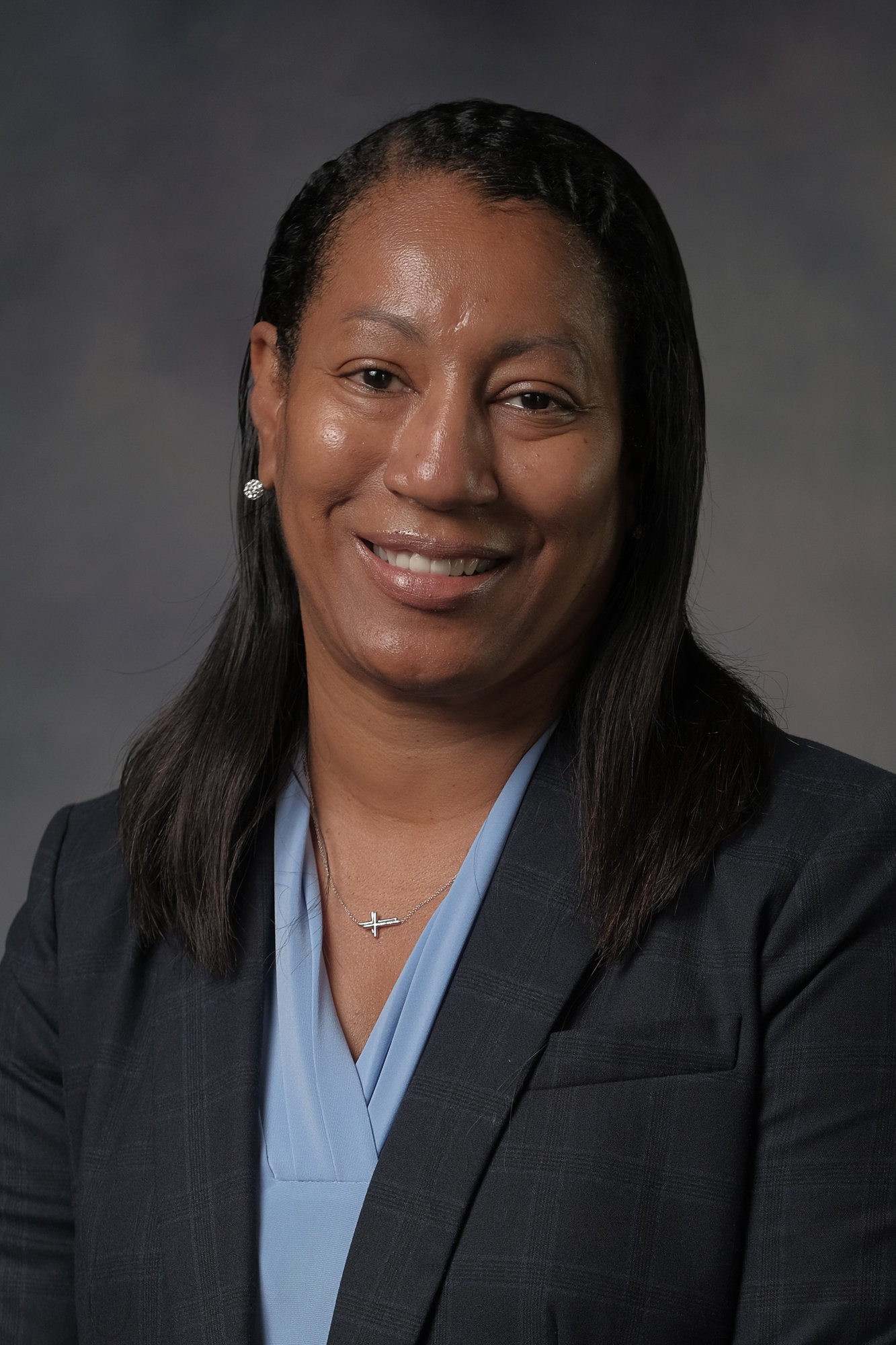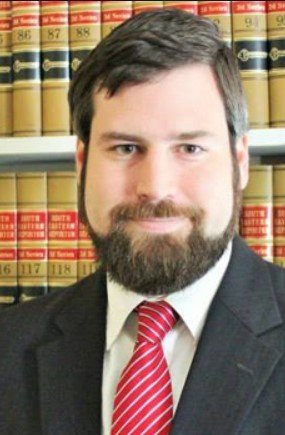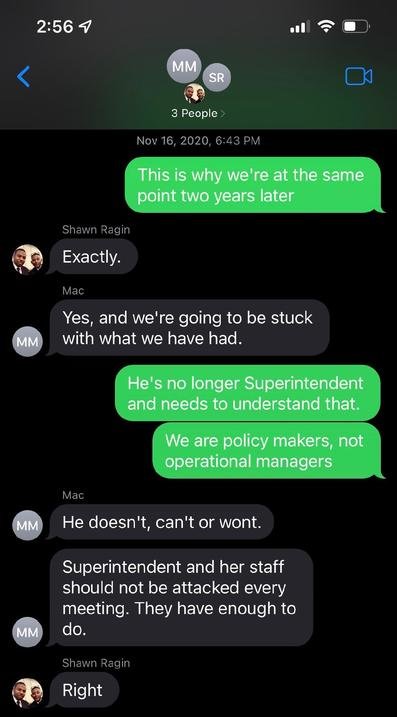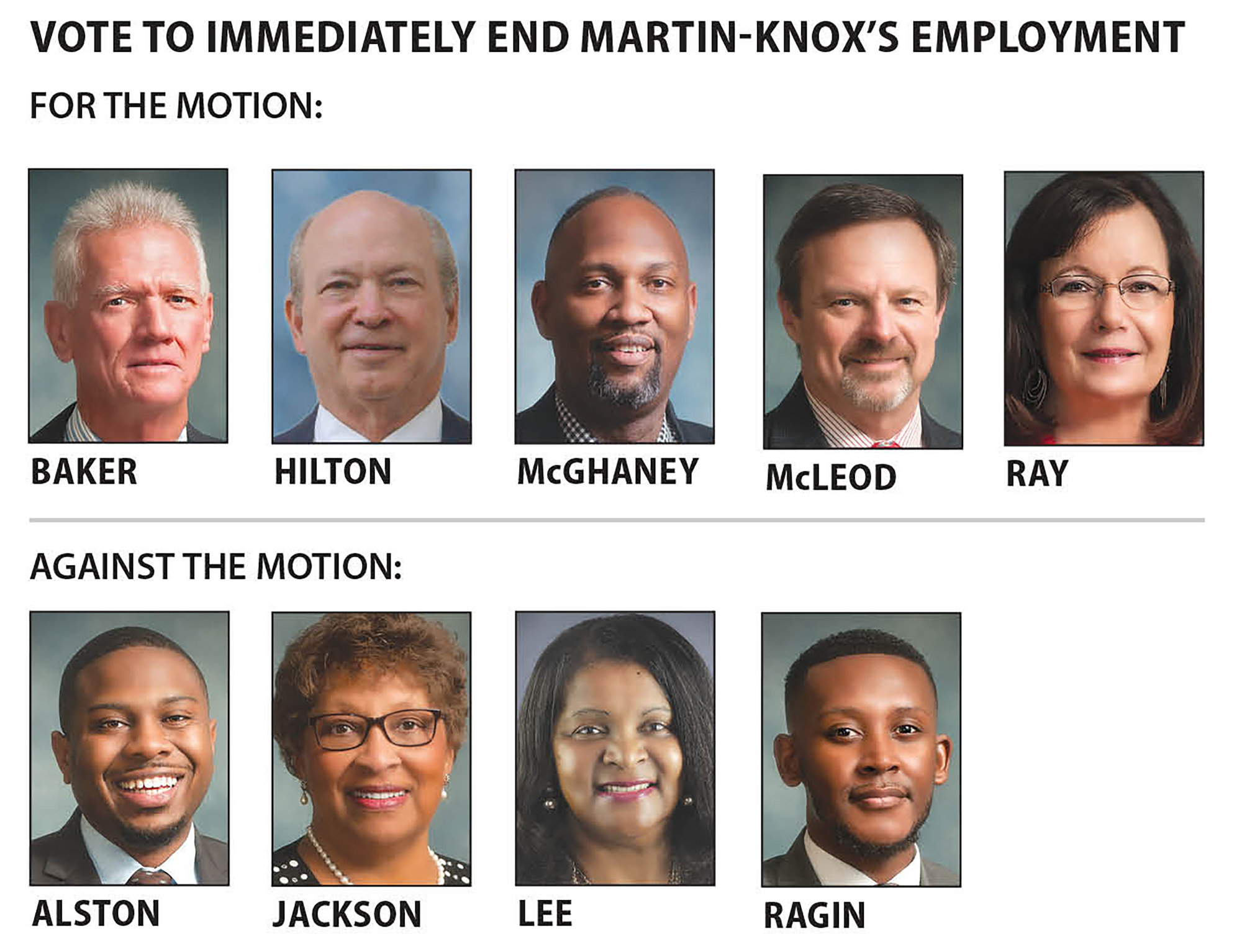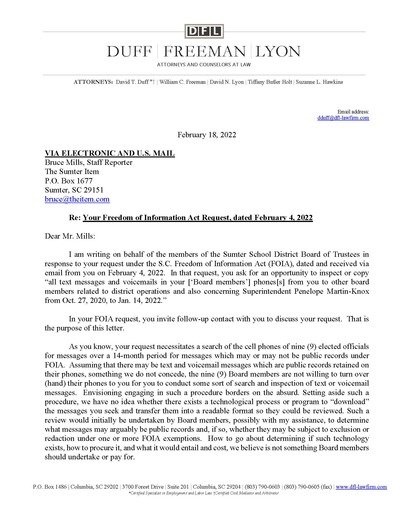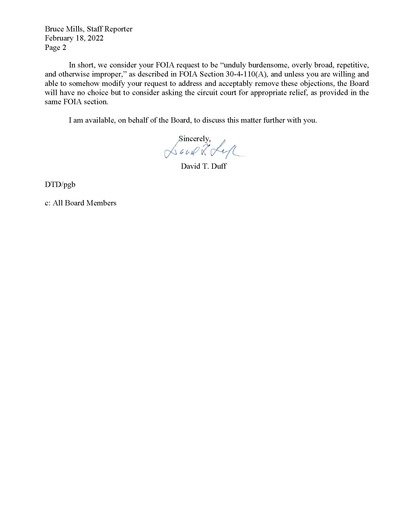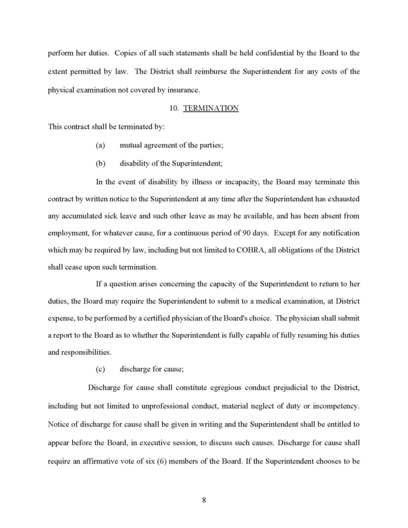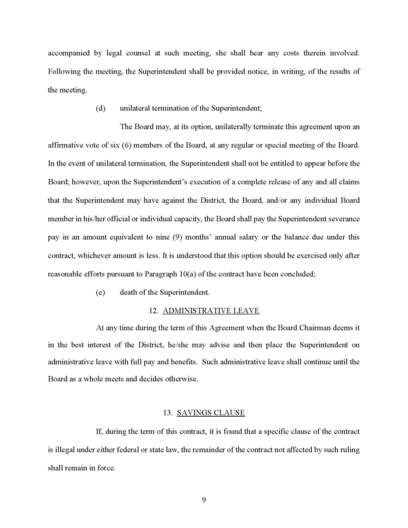What went wrong with Sumter school board and Martin-Knox? FOIA noncompliance and lack of statement shroud reason for rift
Read an Item editorial related to this reporting: The public deserves to know what happened between Sumter school board, Martin-Knox
bruce@theitem.com
Penelope Martin-Knox is out as superintendent, according to Sumter School District, but what happened to cause the 5-4 board divide in not extending her contract beyond June 30?
That has been a burning question for many in Sumter since the start of January.
By law, a public body does not have to reveal why it makes certain decisions on personnel matters. Sumter School District's Board of Trustees is not obligated to tell The Sumter Item and never has to date.
But there seemed to be only minimal "red flags," at best, from board meetings since Martin-Knox's first evaluation in October 2020 when she received the top score possible.
However, the newspaper tried plenty of investigation into the matter through dozens of phone calls, emails, text messages and three state Freedom of Information Act requests to district administration and board members.
Following is a summary of The Item's efforts and a general timeline of events since mid-December when it was first made public that the superintendent and the board would be parting ways.
THE TIMELINE
Dec. 14 — Martin-Knox announces she is not seeking an extension
On the night of the superintendent's annual performance evaluation, board Chairwoman Barbara Jackson reads a statement that Martin-Knox will not be seeking a contract extension past this school year. Her contract ends June 30.
Dec. 18 — Alston, Ragin say board majority fueled superintendent's departure
In the immediate days following the announcement, Trustees Brian Alston and Shawn Ragin speak to The Item and say five other board members in general treated Martin-Knox with disrespect, creating an environment where the leader is now not seeking an extension.
They claim there was "constant meddling" in district operations, "micromanagement" and politics taking precedence over the work for children, according to letters they write.
Jan. 10 — Motion to give superintendent a 3-year extension fails 5-4; trustees vote 4-3-2 to allow state association to facilitate new leader search
At their regularly scheduled Jan. 10 board meeting, Alston raises a motion to extend Martin-Knox's contract by three years through June 30, 2025. The motion fails 5-4 with board members Frank Baker, Johnny Hilton, Daryl McGhaney, Matthew "Mac" McLeod and Sherril Ray voting it down. Trustees in favor of the extension include Alston, Jackson, Shawn Ragin and Gloria Lee.
It was not known at the time, but Alston later said at the Feb. 28 board meeting that his motion from Jan. 10 was not discussed during the meeting's executive session. It was not on the Jan. 10 agenda either and therefore would be deemed as an illegal vote, according to the S.C. Press Association's media attorney.
The vote did reveal the split between board members on extending Martin-Knox's contract that was not known publicly before Jan. 10.
Immediately following this vote, the trustees pass a motion 4-3 with two abstentions — or nonvotes — to allow the South Carolina School Boards Association to conduct a new superintendent search. Trustees voting in favor include McGhaney, Baker, McLeod and Ray. Those voting against include Jackson, Alston and Ragin, and the two abstentions are Hilton and Lee.
Additionally, during public participation at the meeting, most of the 15 participants' comments express support for Martin-Knox in her role as the district's leader and frustration with the school board for continual changes and turnover in the superintendent post since 2011. Martin-Knox was the fourth superintendent since Sumter County's two public school districts consolidated into one.
Jan. 11 — Martin-Knox says if vote was in favor of extension, she would have accepted
In response to an inquiry from The Item, the superintendent said that if a board majority had passed the motion, she would have accepted the offer to continue in the role.
"Let me preface by saying that I am deeply moved by the outpouring of support that was demonstrated by our community last evening," she said. "As I have stated from my onset since my arrival in Sumter, my commitment has been and will always be to our children. The feedback received last evening was the signal that was necessary to shape the decision to continue to move forward. So, the answer would be yes. I would have been receptive to the extension."
Jan. 24 — Trustees accept association's search proposal in 5-3-1 vote
The school board accepts the state School Boards Association's superintendent search services proposal in a 5-3 vote with one abstention. Trustees in favor include Baker, Hilton, McGhaney, McLeod and Ray. Board members against the proposal include Alston, Ragin and Lee. Jackson, the board chairwoman, does not vote.
The new superintendent search officially opens for applicants on Jan. 27.
Feb. 20 — Martin-Knox named superintendent in Raytown, Missouri
Raytown School District in Raytown, Missouri, a suburb of Kansas City, announces the hiring of Martin-Knox as its incoming superintendent, effective July 1.
Feb. 28 — Board votes 5-4 to pay Martin-Knox remainder of her contract and leave early
At the regularly scheduled board meeting on Monday, McGhaney raises a motion to pay the superintendent the remaining balance of her contract and basically allow her to walk away, effective immediately.
Martin-Knox says she is not in agreement with the terms.
Trustees who vote in favor include McGhaney, Baker, Hilton, McLeod and Ray. Those against were Jackson, Alston, Ragin and Lee, the same split from Jan. 10.
Jay Bender, legal counsel for the S.C. Press Association, said the motion, vote and ensuing action were illegal under the Freedom of Information Act because they were not listed on the meeting agenda.
He said the board effectively terminated Martin-Knox's contract, even though "termination" was not used in the motion.
"They accelerated the date she was leaving," Bender said, "which looks, walks and talks like termination. If her contract expired June 30 and the board without having the item on the agenda voted to accelerate the end date of her employment and pay her leave time and whatever else, then that was a termination, and it had to be on the agenda."
According to a copy of Martin-Knox's contract obtained by The Item, termination by the board requires six trustees' votes. They were one vote shy.
Secondly, the full motion allows district Chief of Schools' Brenda Hafner to serve as the lead administrator in Martin-Knox's absence until a new superintendent is selected. Bender said that was also illegal because it was also not an agenda item.
Finally, the full motion places a moratorium on all administrator and district-level positions — effective immediately — until a new superintendent is selected.
Three of the five board members who both voted against extending Martin-Knox's contract and for sending her away now have spouses who work for the district, including two whose wives have administration-level positions.
Daryl McGhaney's wife, Vivian Fleming-McGhaney, is the special education curriculum coordinator. She also serves on Sumter County Council. McGhaney made the motion on Feb. 28.
Matthew "Mac" McLeod's wife, Jade McLeod, is the executive director of instruction.
Sherril Ray's husband, Billy Ray, teaches physical education at Sumter High School. Ray immediately seconded the Feb. 28 motion.
March 2 — Hafner named lead administrator for now
A district spokeswoman emails a one-sentence statement, followed by a two-sentence quote from Hafner, that "as a result of board action February 28" she has been named lead administrator while the superintendent search continues.
LOOKING FOR THE 'WHY'
Because repeated requests, including calls, emails and text messages, as to what happened to cause the rift between the board majority and Martin-Knox went unanswered, The Sumter Item filed multiple Freedom of Information Act requests to dig further.
FOIA is a state law that keeps meetings of government and elected officials in the open and provides the public and the media a tool to obtain public records when officials do not give them up willingly.
Some requests were fulfilled. Some were declined.
The district has complied, while all but two board members (and now, after Monday's meeting, the promise of a third) have not.
Email was an inconsistent method of communication between Martin-Knox and board
Allegations from Alston and Ragin of board meddling and micromanagement could not be proved or disproven via email correspondence between Martin-Knox and board members because they rarely used email to discuss district matters.
The Item received emails from district staff between the superintendent, nine voting-member trustees and Shaw Air Force Base liaison Robin Mills less than a month after requesting them.
A review of these emails showed four of nine voting trustees hardly ever emailed Martin-Knox in the 14-month timeframe.
In those sparse emails, a few topics of concern expressed by trustees included the district's handling of COVID-19 in February 2021 by Hilton and his belief in a need to return to face-to-face instruction as soon as possible. His email detailed a summary of points he made in a personal meeting with the superintendent at the time.
Ray also has a few random emails during the timeframe to the superintendent, expressing her concern with the district's hiring processes and getting the most qualified people in positions, among other topics. These emails generally contain points on numerous topics, most of which were never addressed at the public board meetings.
Board business conducted over texts, but to what extent unclear without full FOIA compliance
Only two board members and Martin-Knox have so far complied with The Item's requests for text messages and voicemails. A third board member scheduled a time for review of them after the Feb. 28 meeting.
The newspaper's request was for board members' texts among themselves about district operations and also concerning the superintendent, but not necessarily including the superintendent.
Martin-Knox, who met with The Item on Feb. 24, said her policy was to text the trustees on emergency issues that arose in the district.
She did not delete board members' messages from her personal phone.
Most trustees did not use text often to communicate with her, she said. When they did, it was generally supportive.
Baker, who was Sumter's superintendent from 2013-17, during which time the district overspent its budget by millions and reduced its general fund balance to just more than $100,000, did text at times during the last 15 months with questions on various operations and personnel hiring questions. He told Martin-Knox he had personally received phone calls and complaints from district employees and others and was reporting them to the superintendent.
Ray also had some texts to Martin-Knox on personnel hiring questions.
Board policy is for trustees to take any questions, complaints and concerns that arise and refer them directly to the superintendent and to abstain from any individual counsel or action. Suggestions or recommendations are to be made to the superintendent, and trustees are not to give direct orders to any district subordinates, per policy.
The five trustees who would later vote against extending her contract basically stopped returning any of Martin-Knox's texts and phone calls in late October through December of last year, she said.
Martin-Knox's initial, annual performance evaluation was in October 2020. Her second annual evaluation did not occur until December 2021. Martin-Knox's contract required an evaluation sometime in the fall term.
Alston and Ragin are the two trustees to date who have met with the newspaper to review their text messages with fellow board members.
That meeting revealed a clear communication divide on the board as their phones showed hardly any texts from Baker, Hilton, McGhaney, McLeod and Ray.
They said the divide has existed basically since the board had a reorganization in November 2020, when the current officers and committee chairs were elected. They described the board as "stuck" on various issues.
Alston said a divide on being "policy makers" versus "operational managers" has further divided the board since then. Alston and Ragin prefer the policy stance, they said, while some others tend to involve themselves more in district operations.
Alston shared a text between him, Ragin and McLeod where the three discussed the "stuck" nature and Baker's role as a board member.
"He's no longer superintendent and needs to understand that," Alston texted. "We are policy makers, not operational managers."
"He doesn't, can't or wont," McLeod responded.
McLeod then added, "Superintendent and her staff should not be attacked every meeting. They have enough to do."
"Right," Ragin responded.
Alston and Ragin said they didn't know the five members wanted to go in another direction with a new superintendent until about mid-October, about the time for Martin-Knox's second annual evaluation.
That coincides with the time Martin-Knox said she stopped receiving texts and phone calls from them.
After last week's board meeting, Jackson, the board chairwoman, said she would meet The Item for the newspaper to review her phone. She was among the four who voted in favor of Martin-Knox. That meeting is scheduled for Tuesday.
BOARD ATTORNEY THREATENS LAWSUIT OVER REQUEST
Despite compliance from individual members, the school board's attorney — Dave Duff — said in a letter two weeks following The Item's request for texts and voicemails that the board did not want to do so.
Duff explained, according to state law, text messages being considered public records is somewhat of a gray area, which is true.
"Assuming that there may be text and voicemail messages which are public records retained on their phones, something we do not concede, the nine (9) board members are not willing to turn over (hand) their phones to you for you to conduct some sort of search and inspection of text or voicemail messages," Duff wrote. "Envisioning engaging in such a procedure borders on the absurd."
Duff added he did not know how such a technology transfer of messages could occur and the cost involved.
"In short, we consider your FOIA request to be 'unduly burdensome, overly broad, repetitive, and otherwise improper,' as described in FOIA Section 30-4-110(A), and unless you are willing and able to somehow modify your request to address and acceptably remove these obligations, the board will have no choice but to consider asking the circuit court for appropriate relief, as provided in the same FOIA section," he wrote.
S.C. PRESS ASSOCIATION ATTORNEY REBUTTAL
In response, S.C. Press Association attorney Taylor Smith said the full board's response — through its attorney — is not beneficial to the process of transparency.
"It is noteworthy (but not necessarily commendable) the superintendent and those board members fulfilled their legal obligations to allow for inspection of the public records on their cellphones," Smith said. "It is highly frustrating and unfortunate that the initial response of the district's Board of Trustees called the process to search for these and other text messages 'absurd' and even alluded to suing The Item to prevent their disclosure.
"Furthermore, the full board's bald assertion that the mere search for or implementation of technology that would allow for a board member to see if text messages were public in nature would constitute something board members should not have to 'undertake or pay for' is wrong."
Smith added he thinks email is a better way for board members to conduct public business.
"There is no legal duty to use one's cellphone to conduct public business via text message," he said. "Email is a tried and true communication technology. I see no reason not to require board members to use it to conduct public business. Unless, of course, you wish the public frustrated in trying to learn its business."
WHERE DOES THE PUBLIC NOW STAND?
As said previously, the board majority has been unwilling to detail what went wrong in its relationship with Martin-Knox since her first evaluation in late 2020. Without the majority's cooperation on text messages and voicemails, the community doesn't yet know the full picture.
Sumter School District has been through four superintendents since 2011 when the former city and county districts consolidated.
Community member Sandra Burgess said those directly in the public education realm are hurting the most right now.
"The community is suffering because of the division among the board," she said. "The children are suffering. The teachers are suffering. I mean, they are already having to fight the pandemic, and then now they are having to fight the board or not trust the board that governs them.
"It's not about the children anymore. It's about the board and infighting with the board."
More Articles to Read

